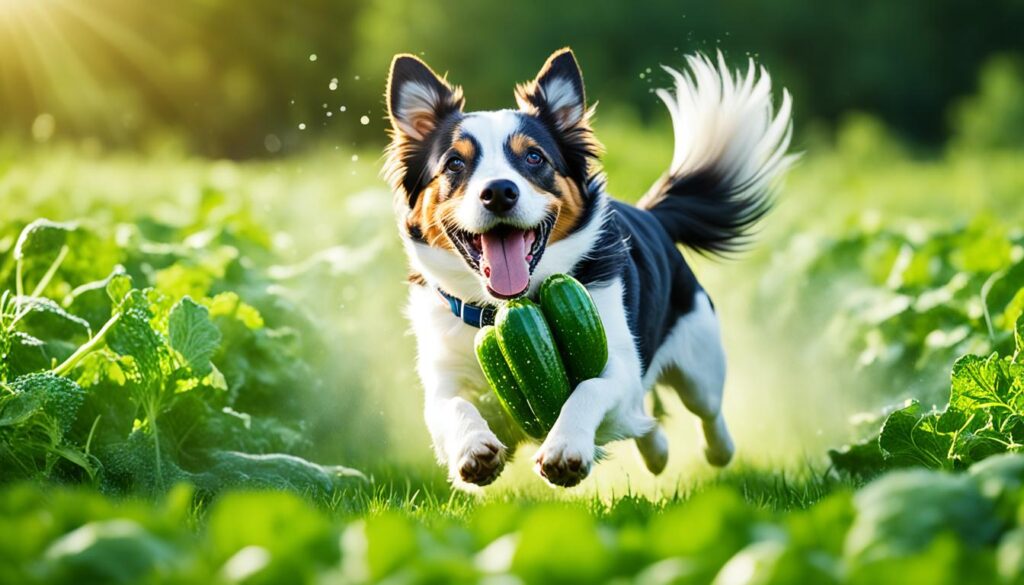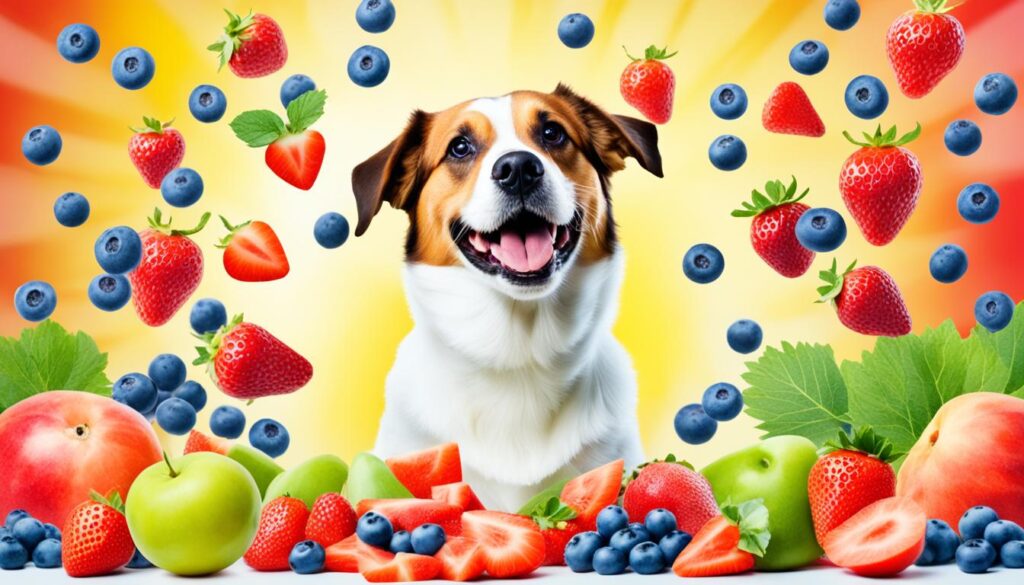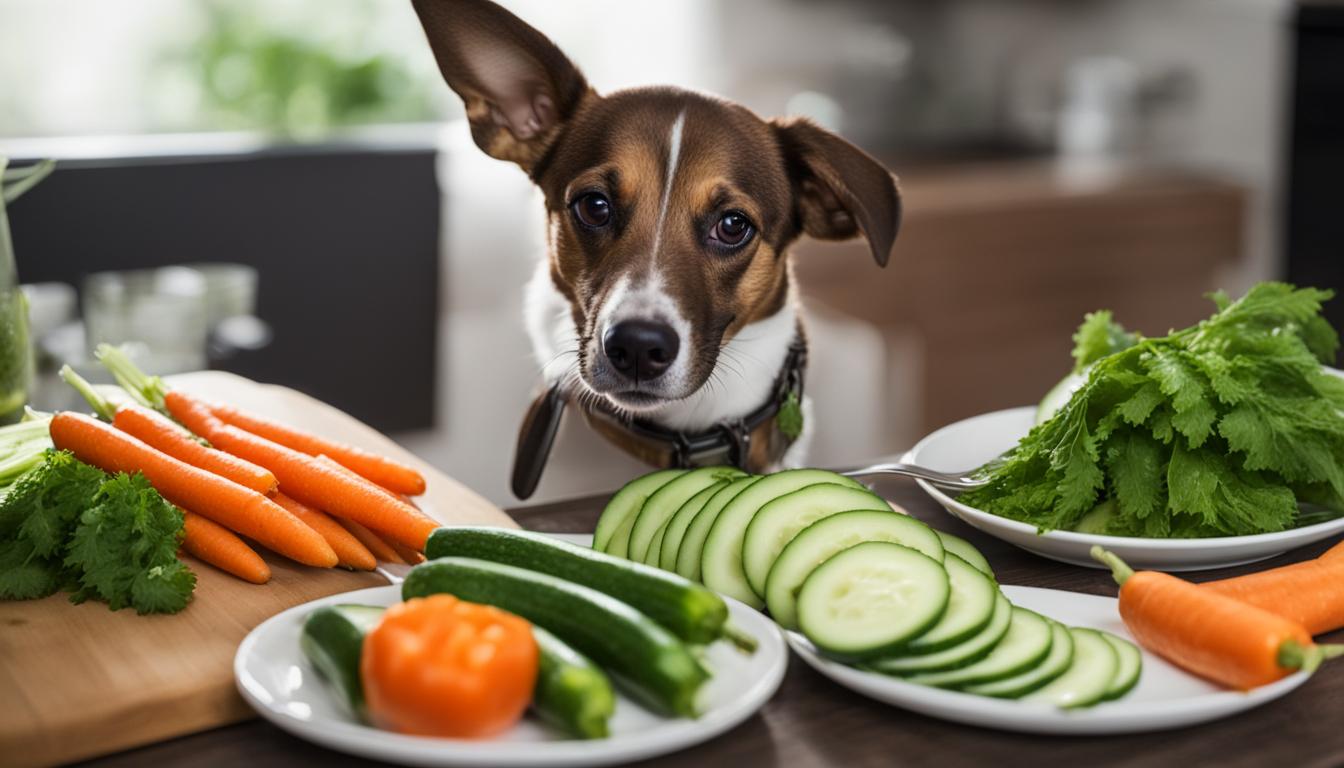As an Amazon Associate I earn from qualifying purchases.
Hey there, dog lovers! We all want our furry friends to be happy and healthy, and one way to achieve that is by giving them the right snacks. But have you ever wondered if dogs can have cucumbers? Well, you’re about to find out!
Picture this: It’s a hot summer day, and you’re enjoying a refreshing cucumber salad. Your faithful canine companion sits by your side, eyes locked on that enticing green crunch. That’s when the question pops into your head, “Can dogs have cucumbers?” It’s a valid concern because, let’s face it, we all want to keep our four-legged friends safe and satisfied.
Well, the good news is, cucumbers can indeed be a safe and healthy treat for your furry buddy. They are packed with hydrating properties and offer a low-calorie option for those pups watching their waistlines. But before you head to the fridge and start slicing up some cucumbers for Fido, let’s dive into the details.
First things first, it’s always best to consult with your vet before introducing any new foods into your dog’s diet. Our furry friends have unique dietary needs, and what works for us humans may not necessarily be suitable for them. It’s always better to be safe than sorry!
Now, when it comes to feeding cucumbers to dogs, there are a few things to keep in mind. Firstly, make sure you wash the cucumbers thoroughly and peel them. Dogs may have a harder time digesting the skin, so removing it is essential. Additionally, chopping the cucumbers into small, bite-sized pieces will make it easier for your pup to enjoy without any choking hazards.
It’s also essential to note that while fresh cucumbers are safe, pickled cucumbers should be avoided. The pickling process often involves harmful ingredients like excessive salt or spices that can be harmful to your dog’s health. Stick to the plain, raw cucumbers for a safe and nutritious snack option.
Key Takeaways:
- Cucumbers can be a safe and healthy treat for dogs, offering hydration and a low-calorie option.
- Consult with your vet before introducing cucumbers or any new food into your dog’s diet.
- Wash and peel the cucumbers, then chop into small, manageable pieces before giving them to your pup.
- Avoid pickled cucumbers, as they may contain harmful ingredients for dogs.
- Remember, moderation is key. Cucumbers should be given as an occasional treat, not as a meal replacement.
Are Cucumbers Good for Dogs?
Cucumbers offer a refreshing and healthy treat option for your canine companion. Not only are they low in calories, making them a guilt-free snack, but they also provide numerous benefits for your dog’s overall well-being.
Cucumbers are rich in water content, which helps keep your dog hydrated, especially during warm summer months. This can be particularly beneficial if your furry friend tends to get overheated easily.
In addition to hydration, cucumbers contain essential vitamins such as K, C, and B. While it’s important for dogs to receive all their necessary nutrients from their regular diet, the vitamins found in cucumbers can contribute to their overall health.
“Cucumbers offer a refreshing and healthy treat option for your canine companion.”
Furthermore, cucumbers can be a helpful addition to the diet of dogs that need to lose weight. Their low-calorie content and high water content make them a filling snack without adding excessive calories to their daily intake.
So whether you’re looking for a cool and hydrating treat for your pup on a hot day or want to provide a nutritious snack that won’t compromise their weight management goals, cucumbers are a paw-some option!
Nutritional Value of Cucumbers for Dogs
| Nutrient | Amount per 100g of Cucumbers |
|---|---|
| Water | 95.23g |
| Calories | 15 |
| Vitamin K | 16.4mcg |
| Vitamin C | 2.8mg |
| Vitamin B6 | 0.04mg |
Table: Nutritional Value of Cucumbers for Dogs
How to Safely Feed Cucumbers to Dogs
Feeding cucumbers to your furry friend can be a refreshing and healthy treat option. However, it’s crucial to follow safe practices to ensure your dog’s well-being. Here’s a guide on how to feed cucumbers to dogs effectively:
1. Wash, Peel, and Remove Seeds
Before offering cucumbers to your dog, make sure to wash them thoroughly to remove any dirt or pesticides. It’s also essential to peel off the skin, as it can be difficult for dogs to digest. Furthermore, remove the seeds, as they can cause gastrointestinal issues.
2. Chop Into Dog-Friendly Pieces
To prevent choking hazards, it’s crucial to chop the cucumbers into small, manageable pieces. Dogs have different jaw sizes, so be mindful of the size you choose. Bite-sized slices are recommended to ensure easy chewing and safe consumption.
3. Keep It Plain and Simple
When giving cucumbers to your dog, it’s best to offer them plain, without any seasoning, salt, or other additional ingredients. Seasonings like garlic or onion can be toxic to dogs and should be avoided. Plain cucumbers provide a hydrating and low-calorie snack for your furry buddy.
4. Portion Size Matters
Just like with any treat, moderation is key. The portion size of cucumbers for dogs will depend on their size and weight. Smaller breeds can receive a couple of small cucumber slices a few times per week, while larger dogs can enjoy a few more slices. Always consult with your veterinarian to determine the appropriate portion size for your furry friend.
Remember, while cucumbers can be a healthy addition to your dog’s diet, they should not replace their main meals. Canine nutrition should always be well-balanced and complete. Cucumbers should be offered as an occasional treat to avoid any potential digestive issues.
Following these safe practices will ensure that your dog can enjoy the benefits of cucumbers without any risks. Now that you know how to prepare and feed cucumbers to your furry friend, you can offer them this hydrating and nutritious snack with confidence!
Health Benefits of Cucumbers for Dogs
When it comes to keeping your furry friend healthy and happy, cucumbers can be a fantastic addition to their diet. These refreshing veggies offer a range of health benefits for dogs, from hydration to low-calorie treats.
Cucumbers are packed with water, making them an excellent source of hydration, especially during hot weather. Staying well-hydrated is crucial for dogs to maintain optimal health and prevent dehydration.
Not only are cucumbers hydrating, but they are also low in calories. This makes them a great choice for dogs who are watching their weight or need to shed a few pounds. You can provide your canine companion with a satisfying snack without worrying about excessive calorie intake.
In addition to hydration and low-calorie content, cucumbers contain essential nutrients that support your dog’s overall well-being. They are rich in minerals like calcium, potassium, and magnesium, which play a vital role in supporting muscle function and maintaining healthy bones.

Cucumbers are also packed with antioxidants, which can help prevent chronic illnesses and support your dog’s immune system. These powerful compounds help protect your furry friend’s cells from damage caused by free radicals, promoting overall health and longevity.
Overall, cucumbers offer a range of health benefits for dogs. They provide hydration, are low in calories, and contain essential nutrients and antioxidants. Incorporating cucumbers into your furry friend’s diet can be a nutritious and delicious way to keep them happy and healthy.
Other Fruits Dogs Can Eat
In addition to cucumbers, there are several other fruits that are safe and beneficial for dogs. These fruits can provide additional nutrients and variety to a dog’s diet while offering a tasty and healthy treat alternative. It’s important to remember portion sizes and moderation when feeding fruits to dogs.
Here are some examples of safe fruits for dogs:
| Fruit | Benefits |
|---|---|
| Apples (seeds and core removed) | Rich in vitamins A and C; provide fiber |
| Bananas (in moderation) | High in potassium; contain vitamins B6 and C |
| Blueberries | Packed with antioxidants and vitamins C and K |
| Strawberries | Contain fiber, antioxidants, and vitamin C |
| Oranges (in small amounts) | Provide vitamin C, fiber, and hydration |
| Watermelon (seeds and rind removed) | High in water content; a refreshing treat |
| Pineapple | Contains bromelain, an enzyme that aids digestion |
These fruits can be offered to your furry friend as a healthy and enjoyable snack. Remember to always remove any harmful parts, such as apple seeds and the core, and offered them in moderation. Variety is key to ensuring a balanced canine diet.
Words of Caution:
When introducing new fruits to your dog’s diet, it’s essential to monitor them for any adverse reactions. Some dogs may have sensitivities or allergies to certain fruits. Always consult with your veterinarian before making any significant changes to your dog’s diet.

Conclusion
So, can dogs have cucumbers? Absolutely! Not only are cucumbers a safe treat option for your furry friend, but they also offer numerous health benefits. With their low calorie and high water content, cucumbers can be a great addition to a dog’s diet, especially if they need to shed a few pounds. But remember, always consult with your veterinarian before introducing any new food into your dog’s routine.
When giving cucumbers to your dog, make sure to wash them thoroughly, peel the skin, and chop them into small, dog-friendly pieces. Avoid pickled cucumbers as they usually contain harmful ingredients. Instead, stick to fresh and raw cucumbers to maximize the health benefits.
In addition to cucumbers, there are many other dog-friendly vegetables and fruits that you can incorporate into your furry friend’s diet. Apples, bananas, blueberries, and watermelon are just a few options that can provide your dog with a variety of nutrients and flavors while keeping them happy and healthy.
So, when you’re looking for healthy treats for your beloved canine companion, don’t forget about cucumbers and other dog-friendly vegetables. They can make a refreshing and nutritious addition to your dog’s snack time, satisfying their taste buds and keeping their wagging tails in full swing!
FAQ
Can dogs have cucumbers?
Are cucumbers good for dogs?
How do I safely feed cucumbers to my dog?
What are the health benefits of cucumbers for dogs?
Can dogs eat other fruits?
Can dogs have cucumbers as a regular treat?
Are pickled cucumbers safe for dogs?
Source Links
- https://www.purina.co.uk/articles/dogs/feeding/what-dogs-eat/can-dogs-eat-cucumber
- https://www.akc.org/expert-advice/nutrition/can-dogs-eat-cucumbers/
- https://www.forbes.com/advisor/pet-insurance/pet-care/can-dogs-eat-cucumber/
As an Amazon Associate I earn from qualifying purchases.

